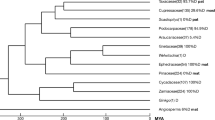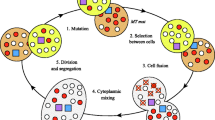Abstract
The genomes of cytoplasmic organelles (mitochondria and plastids) are maternally inherited in most eukaryotes, thus excluding organellar genomes from the benefits of sexual reproduction and recombination. The mechanisms underlying maternal inheritance are largely unknown. Here we demonstrate that two independently acting mechanisms ensure maternal inheritance of the plastid (chloroplast) genome. Conducting large-scale genetic screens for paternal plastid transmission, we discovered that mild chilling stress during male gametogenesis leads to increased entry of paternal plastids into sperm cells and strongly increased paternal plastid transmission. We further show that the inheritance of paternal plastid genomes is controlled by the activity of a genome-degrading exonuclease during pollen maturation. Our data reveal that (1) maternal inheritance breaks down under specific environmental conditions, (2) an organelle exclusion mechanism and a genome degradation mechanism act in concert to prevent paternal transmission of plastid genes and (3) plastid inheritance is determined by complex gene–environment interactions.
Similar content being viewed by others
Main
Cytoplasmic genomes are maternally inherited in most eukaryotes1,2. It is generally believed that the uniparental inheritance of organelles and their genomes makes them asexually reproducing genetic systems3,4,5. Lack of sexual recombination is expected to lead to the eventual mutational meltdown of organellar genomes, a phenomenon widely known as Muller’s ratchet6,7,8. This is due to the accumulation of deleterious mutations that cannot be separated from (only rarely occurring) beneficial mutations and can be considered as a case of ‘genetic hitchhiking’9. While there must be evolutionary forces that explain the strong prevalence of uniparental inheritance, there must also be compensatory mechanisms that allow organellar genomes to escape mutational meltdown.
In plants, the two organellar genomes (plastids and mitochondria) have lower mutation rates than nuclear genomes10,1) were analysed in Model 3 (nrep.total = 13 harvests, ~2.65 million seedlings; Extended Data Tables 1 and 2). Black horizontal bars show mean rates per genotype/treatment combination. Rates per experimental group were estimated (coloured horizontal lines) with CI95s (coloured boxes). Dashed lines depict the basal plastid paternal transmission (grey) and the theoretical maximum (black). Effect estimates were tested by simultaneous two-tailed Wald z-tests: dpd1 genotype (P = 6.22 × 10−35), chilling treatment (P = 2.20 × 10−126) and the interaction between both factors (P = 3.17 × 10−10) were significant. ***P < 0.001, α = 0.05. f, Visualization of paternal plastid transmission by spectinomycin selection (Experiments 2 and 3; Table 1). Blue arrowheads indicate green sectors (paternal plastids). Insets show magnified examples.
Consistent with previous findings reported in A. thaliana, the tobacco dpd1 mutant does not display a noticeable vegetative growth phenotype. Plant growth, reproductive transition and floral development in the dpd1 mutant were comparable to wild-type plants (Extended Data Fig. 5a). However, a reduction in pollen viability was observed in the dpd1 mutant (Extended Data Fig. 5b,c). Confocal laser-scanning microscopy and quantitative PCR analysis revealed retention of plastid DNA in mature pollen grains of the dpd1 mutant (Fig. 3c,d and Extended Data Fig. 5d). Large-scale inheritance assays showed that the dpd1 mutant displayed greatly elevated levels of paternal plastid transmission into the progeny (Fig. 3e,f and Table 1), thus identifying the rate of plastid genome degradation as a genetic factor determining the mode of plastid inheritance.
Synergistic gene–environment control of plastid transmission
Next, we wanted to examine whether the combined action of genes and environment confers even higher levels of biparental plastid inheritance. To this end, we comparatively assessed the effects of chilling stress on the transmission frequency of paternal plastids in the wild-type and the dpd1 genetic backgrounds. Indeed, pollen development at low temperature in the dpd1 mutant resulted in an approximately tenfold increase in paternal plastid transmission compared with the effect of the dpd1 genotype alone or that of the environment alone (Table 1 and Fig. 3e,f). Paternal plastid transmission reached frequencies between 2.2% and 3.2% (in two independent experiments; Fig. 3e and Table 1). These data show that genes and environment act synergistically in the control of plastid inheritance, and their combined action can result in substantial levels of biparental inheritance (Fig. 3e). It is also noteworthy that the environmental factor low temperature and the genetic factor dpd1 are not entirely independent in their effects on plastid inheritance, as revealed by the negative interaction between them (Fig. 3e).
Paternally transmitted plastids readily enter the germline
Biparental inheritance events in which the inherited paternal plastids are present in the shoot apical meristem (Extended Data Fig. 2b,c and Fig. 4a,b) are particularly relevant in that from there, they enter the germline (upon transition of the apical meristem into a floral meristem) and become heritable. Therefore, large-scale screens were conducted to quantitatively assess the entry of paternal plastids into shoot and root apical meristems in the wild-type and the dpd1 genetic backgrounds under ambient temperature or chilling stress. Presence of paternal plastids was evidenced by GFP fluorescence in the meristem (Extended Data Fig. 2b,c) and continued plant growth in the presence of spectinomycin (Fig. 4a). The presence of paternal plastids in the shoot apical meristem was observed at high frequency, in almost half of the biparental transmission events in dpd1 under chilling stress (cf. Table 1 and Fig. 4b).
a, Images of seedlings with inherited paternal plastids present in the shoot apical meristem (SAM, white arrowheads) or root apical meristem (RAM, white arrows), as evidenced by growth in the presence of spectinomycin. Scale bar, 10 mm. b, Quantification of paternal plastid transmission into SAMs and RAMs. Data were obtained from crossing experiments 2 and 3. c, Seed germination assays to confirm the inheritance of the paternally transmitted plastid into the next generation. Seeds from a WT plant, a transplastomic WTptGFP plant and a line with PPI were germinated on medium with 500 μg ml−1 spectinomycin.
To determine whether the inherited paternal plastid genomes can be stably maintained across generations, plants with paternal plastids present in the shoot apical meristem were grown in the greenhouse and self-pollinated for seed production. Uniform resistance of the progeny to spectinomycin (Fig. 4c) demonstrated homoplasmy of the (paternally acquired) plastid genome, which is maternally inherited into the next generation in the absence of stress. Together, these data show that paternally inherited plastids readily enter the germline and are passed on to the next generation, suggesting that the discovered phenomenon has evolutionary significance for adaptation43 and, potentially, speciation44.







